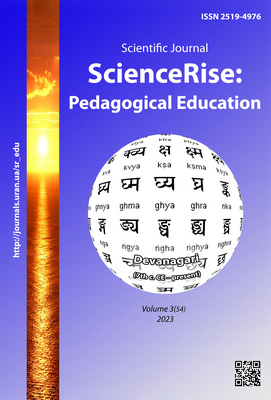Teaching course "Paediatric surgical dentistry" during the martial law
DOI:
https://doi.org/10.15587/2519-4984.2023.282597Keywords:
teaching, children's surgical dentistry, martial law, distance learning, student-centered concept, questionnaireAbstract
The system of higher education of Ukraine in general and Bogomolets National Medical University in particular underwent serious transformations, first as a result of the pandemic, and then – armed aggression and the introduction of martial law. The process of forming the professional competencies of a higher education student consists of several components: the theoretical part, mastering practical skills, independent work using educational and methodological literature, interactive methods, testing, video conferences. In the conditions of martial law, modern interactive teaching methods – lectures, videos – performance of practical skills and examination of patients with certain nosologies, description and interpretation of the results of additional methods of examination of patients become important. The proposed workbook became the main tool for monitoring students' independent work, supplemented with interactive elements – QR codes, which allows the teacher to assess the quality of the student's preparation for the lesson. At the clinical base, conditions were created for continuous safe face-to-face training of students in the shelter, which made it possible to continue classes during the "Airborne alert" signal. The full-time form of education allows the student to work directly with patients. The transition to distance education significantly changed the architecture of the educational process, especially its practical part and active real communication with the teacher and patients. To determine the quality of education and improve the organization of the educational process upon completion of the cycle, graduate students were asked to complete an anonymous survey in the form of a Google questionnaire. The results of the student survey allowed the department team to identify strengths and weaknesses in the organization of the educational process for its further improvement
References
- Impact of the War on Higher Education in Ukraine (2022). Available at: https://pon.org.ua/info-english/engnews/9820-impact-of-the-war-on-higher-education-in-ukraine.html
- Ivanchenko, O., Lurie, K., Melnikova, O. (2023). Higher education in ukraine during war. Grail of Science, 24, 519–522. doi: https://doi.org/10.36074/grail-of-science.17.02.2023.099
- Goncharuk-Khomyn, M., Kaliy, V., Pohorilyak, R., Cavalcanti, A., Keniuk, A., Yavuz, Y., Boychuk, B. (2023). Impact of war on foreign students’ satisfaction with quality of dental and medical education in Ukraine. Brazilian Oral Research, 37. doi: https://doi.org/10.1590/1807-3107bor-2023.vol37.0026
- Oktysiuk Yu. V. (2018). Peculiarities of teaching paediatric oral surgery during ects implementing. Visnyk Ukrainskoi medychnoi stomatolohichnoi akademii. Aktualni problemy suchasnoi medytsyny, 18 (1 (61)), 256–259.
- Harkov, L. V., Iakovenko, L. M., Chekhova, І. L. (2015). 20 Years Experience of Surgical Dentistry and Maxillofacial Surgery of Childhood National Medical University. Profіlaktichna ta ditiacha stomatologіia, 2, 40–44. Available at: http://nbuv.gov.ua/UJRN/ptdc_2015_2_11
- Kuchyn, Yu. L., Vlasenko, O. M., Kucherenko, I. I., Mykytenko, P. V. (2023). Individual educational trajectory of higher medical education students: methodological and technical aspects of implementation. Innovate Pedagogy, 2 (56), 163–169. doi: https://doi.org/10.32782/2663-6085/2023/56.2.36
- Fares, J., Fares, M. Y., Fares, Y. (2020). Medical schools in times of war: Integrating conflict medicine in medical education. Surgical Neurology International, 11, 5. https://doi.org/10.25259/sni_538_2019
- Stølen, S., Stensak, B. (2022). Universities in war and conflict zones – the need for more knowledge and long-term collaborations. The Guild the European Research Intensive-Universities.
- Smith, A. (2011). Think piece prepared for the Education for All Global Monitoring Report UNESCO. The hidden crisis: Armed conflict and education Education and Conflict.
- Dobiesz, V. A., Schwid, M., Dias, R. D., Aiwonodagbon, B., Tayeb, B., Fricke, A., Pham, P., Erickson, T. B. (2022). Maintaining health professional education during war: A scoping review. Medical Education, 56 (8), 793–804. doi: https://doi.org/10.1111/medu.14808
- Yakovenko, L. M., Yefymenko, V. P. (2021). Klinichna baza kafedr yak skladova bezperervnoho osvitnoho protsesu studenta-medyka v suchasnykh umovakh. UMSA – stolittia innovatsiinykh napriamkiv ta naukovykh dosiahnen (do 100-richchia zasnuvannia UMSA), 96–97.
- Yakovenko, L. M., Yefymenko, V. P., Kovtun, T. O., Shafeta, O. B. (2021). Osvitnii protses na bazi klinichnoi kafedry universytetu v umovakh medychnoi reformy Ukrainy. Materialy pidsumkovoi LXIV naukovo-praktychnoi konferentsii. Ternopil, 199–200.
Downloads
Published
How to Cite
Issue
Section
License
Copyright (c) 2023 Vladyslav Iefymenko, Iryna Chekhova, Tetiana Kovtun

This work is licensed under a Creative Commons Attribution 4.0 International License.
Our journal abides by the Creative Commons CC BY copyright rights and permissions for open access journals.
Authors, who are published in this journal, agree to the following conditions:
1. The authors reserve the right to authorship of the work and pass the first publication right of this work to the journal under the terms of a Creative Commons CC BY, which allows others to freely distribute the published research with the obligatory reference to the authors of the original work and the first publication of the work in this journal.
2. The authors have the right to conclude separate supplement agreements that relate to non-exclusive work distribution in the form in which it has been published by the journal (for example, to upload the work to the online storage of the journal or publish it as part of a monograph), provided that the reference to the first publication of the work in this journal is included.







